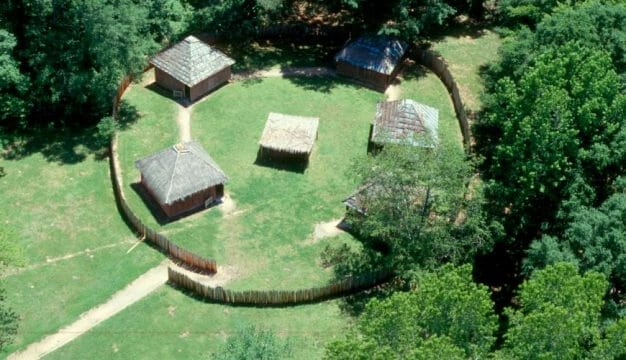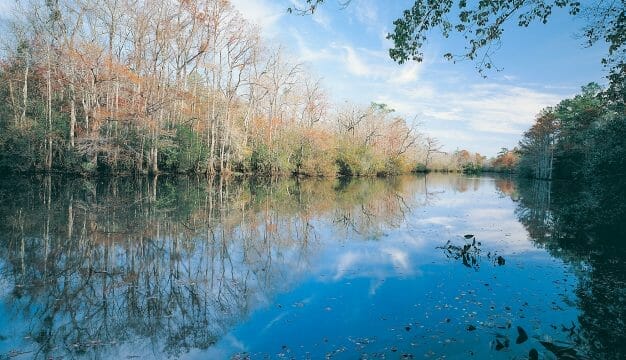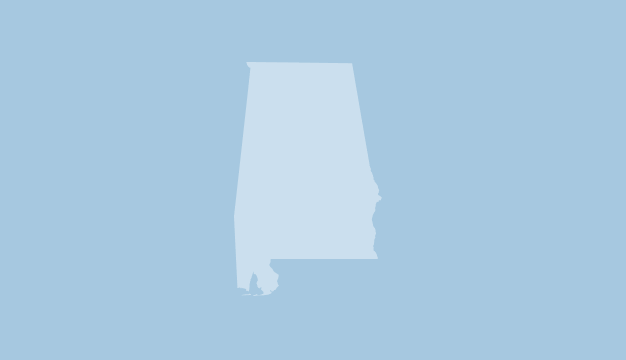Arab
Arab is located in the northeast part of the state primarily in west-central Marshall County, with a portion of the city being located in Cullman County. The city’s distinctive name, pronounced “ey-rab,” resulted from an error by the U.S. postal service when the town was incorporated. Arab has a mayor-council form of government.
History
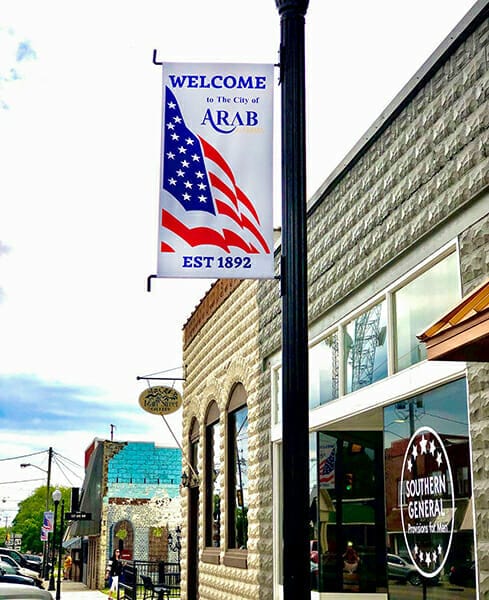 Downtown Arab
The founder of what would become Arab, Stephen Tuttle Thompson, first moved to the area in 1840 with his parents from Rhea County, Tennessee. By 1858, the community that arose around the Thompson farm was known as Thompson’s Village. In 1882, Thompson applied to the federal government to open a post office in the community and submitted three possible names for it: Ink, Blue Bird, and Arad, after his son Ranson Arad Thompson. The government committee chose the latter but misspelled it as Arab. Thompson was granted permission for the post office and became the town’s first postmaster and tax assessor and later served as county commissioner. His son John R. N. Thompson served as the first mayor when the town officially incorporated in 1892. The first telephone line reached Arab in 1908, and the Bank of Arab was established in 1909. The first high school opened in 1922, and electricity came to the town in 1928.
Downtown Arab
The founder of what would become Arab, Stephen Tuttle Thompson, first moved to the area in 1840 with his parents from Rhea County, Tennessee. By 1858, the community that arose around the Thompson farm was known as Thompson’s Village. In 1882, Thompson applied to the federal government to open a post office in the community and submitted three possible names for it: Ink, Blue Bird, and Arad, after his son Ranson Arad Thompson. The government committee chose the latter but misspelled it as Arab. Thompson was granted permission for the post office and became the town’s first postmaster and tax assessor and later served as county commissioner. His son John R. N. Thompson served as the first mayor when the town officially incorporated in 1892. The first telephone line reached Arab in 1908, and the Bank of Arab was established in 1909. The first high school opened in 1922, and electricity came to the town in 1928.
Historically, Arab was a rural community dependent on surrounding farms for its livelihood. The downtown Farmer’s Exchange, founded by resident William Harrison, became an important center for agriculture-related commerce from about 1933. The town began growing significantly after Redstone Arsenal and the Marshall Space Flight Center opened in nearby Huntsville, Madison County, and began drawing workers from throughout the country to the Huntsville area.
Demographics
According to 2020 Census estimates, Arab recorded a population of 8,405. Of that number, 91.5 percent of respondents identified themselves as white, 5.7 percent as Hispanic, 3.7 percent as two or more races, 1.5 percent as Asian, 0.8 percent as African American, and 0.4 percent as American Indian. The town’s median household income was $48,391, and the per capita income was $27,003.
Employment
According to 2020 Census estimates, the workforce in Arab was divided among the following industrial categories:
- Educational services and health care and social assistance (19.6 percent)
- Manufacturing (18.0 percent)
- Retail trade (13.7 percent)
- Professional, scientific, and management, and administrative and waste management services (10.3 percent)
- Construction (6.7 percent)
- Arts, entertainment, and recreation, and accommodation and food services (6.5 percent)
- Other services, except public administration (5.2 percent)
- Public administration (5.1 percent)
- Finance and insurance, and real estate and rental and leasing (5.0 percent)
- Transportation and warehousing, and utilities (3.2 percent)
- Wholesale trade (2.7 percent)
- Information (2.3 percent)
- Agriculture, forestry, fishing and hunting, and extraction (1.8 percent)
Education
Schools in Arab are part of the Arab City School District; the town has one primary school, one elementary school, one junior high school, and one high school. Snead State Community College has a branch campus in Arab.
Transportation
U.S. Highway 231 runs north-south through Arab, and State Highway 69 runs east-west. The closest airport to Arab is the Huntsville International Airport, about 27 miles north of the city.
Events and Places of Interest
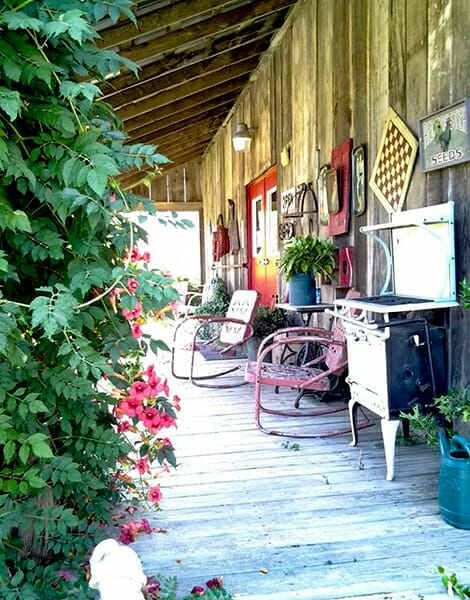 Elvin Light Museum Porch
Arab has two large city parks that include all types of athletics fields, as well as tennis courts, a municipal swimming pool, a multi-purpose arena, pavilions, and a community center. The city hosts the Annual Park and Recreation Horse Show in the arena the second Saturday of each July. The city also has a recreation center that features basketball and racquetball courts, plus a banquet room and kitchen.
Elvin Light Museum Porch
Arab has two large city parks that include all types of athletics fields, as well as tennis courts, a municipal swimming pool, a multi-purpose arena, pavilions, and a community center. The city hosts the Annual Park and Recreation Horse Show in the arena the second Saturday of each July. The city also has a recreation center that features basketball and racquetball courts, plus a banquet room and kitchen.
The Arab Historic Village also is located on the grounds of the Arab City Park. Begun in 1991, the village includes ten buildings representing different historical eras from the late nineteenth century through the 1940s. It hosts such events as “Back When Day,” held annually on the last Saturday in April and featuring demonstrations of quilting, milling corn, and blacksmithing; “Fall Fest,” which is held the second Saturday in September and features arts and crafts and food vendors; and “Santa in the Park,” which is held the first Friday after Thanksgiving.
The Poke Salat Bluegrass Festival is held in downtown Arab on the third Saturday in May. The name refers to the folk term for a salad made from pokeweed, a toxic plant that requires special preparation to make is safe for consumption.
Additional Resources
Marshall County Heritage Book Committee. Heritage of Marshall County. Clanton, Ala.: Heritage Publishing Consultants, 2000.
